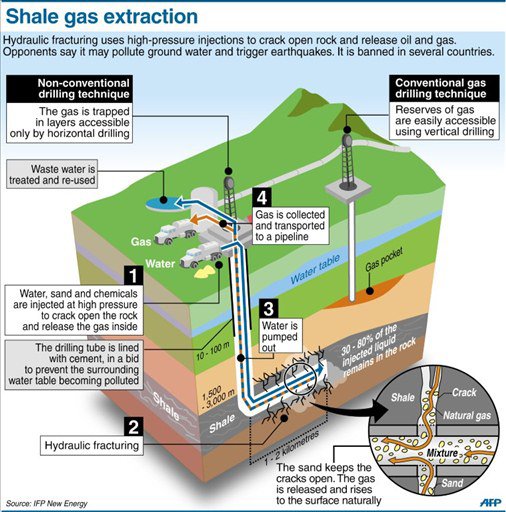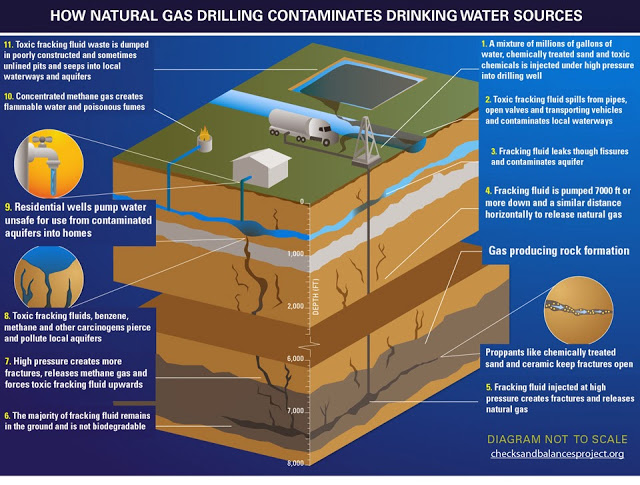A former state-sponsored scientist revealed that he was ordered to alter his findings on the links between fracking and earthquakes.

Hydraulic fracturing is a natural gas extraction method that has become extremely controversial for its environmental impacts. Fracking is the process of drilling down into the earth before a high-pressure water mixture is directed at the rock to release the gas inside. Water, sand, and chemicals are injected into the rock at high pressure, which allows the gas to flow out to the head of the well. Wastewater produced from this process is highly toxic and filled with a variety of chemicals.
In many cases, people who live near fracking sites have been able to set fire to the water and air that comes through their pipes. It has also been found to contaminate drinking water. Unfortunately, fracking is still somewhat popular publicly because people know very little about it and it is also popular politically because all of the politicians have a hand in it.
According to Austin Holland, the former lead seismologist for the state of Oklahoma, officials at the University of Oklahoma worked to actively cover up scientific findings that linked fracking to earthquakes. Oklahoma is one of the most drastic examples of how fracking can cause an upsurge in seismic activity, with the state seeing 639 earthquakes in the year of 2016 alone.
In a deposition last month, Holland stated that Larry Grillot, former dean of OU’s Mewbourne College of Earth and Energy, and Randy Keller, the former director of the Oklahoma Geological Survey pressured him to alter his findings to be more favorable to fracking companies. After the incident, Holland left his position at OU and the Oklahoma Geologic Survey.
“I don’t know if ‘angry’ is the right word, but just disappointed … that I’d spent my time working towards something, and I thought I was in my dream job, and then I couldn’t be a scientist and do what scientists do, and that’s publish with colleagues. Well, that’s the point at which I realized that for my scientific credibility, I had to leave the position I was in,” Holland said.
Keller and Grillot took issue with Holland’s report because they said that it advocated for specific policy changes. However, the only policy measures that Holland advocated was to ensure that important information about fracking and its effects were made available to the public.

Holland was told that the following passage in his article was “unacceptable“:
“Even if a network is owned and operated by industry, regulators must ensure that seismic data are not withheld from the public,” the report read. “Similarly, making injection data, such as daily injection rates, wellhead pressures, depth of the injection interval, and properties of the target formation, publicly accessible can be invaluable for attaining a better understanding of fluid-induced earthquakes. Open sharing of data can benefit all stakeholders, including industry, by enabling the research needed to develop more effective techniques for reducing the seismic hazard.”
Holland went through with publishing the report anyway, and although he did not receive a formal reprimand, his superiors were not pleased.
“Well, the president of the university expressed to me that I had complete academic freedom, but that as part of being an employee of the state survey, I also have a need to listen to the people within the oil and gas industry. So Harold Hamm expressed to me that I had to be careful of the way in which I say things, that hydraulic fracturing is critical to the state’s economy in Oklahoma, and that me publicly stating that earthquakes can be caused by hydraulic fracturing was — could be misleading, and that he was nervous about the war on fossil fuels at the time,” Holland said.
Holland also pointed out that while energy companies and environmentalists both contacted him and attempted to recruit him as a spokesperson for their cause, he did not feel directly threatened by them as he did by the bureaucratic structure within his own industry.
“I was navigating a difficult landscape, but I was not pressured by industry to change what I’m doing, I was pressured by staff. Now, I did — was pressured by Harold Hamm to change the way I spoke about [fracking] in public. And I did have people in the industry say, ‘Well, you can’t say that’ or ‘You can’t say this.’ But the ones that actually write the paycheck control what I say in the public eye and what I don’t,”Holland said.
It was also reported this week that the EPA approved dangerous fracking chemicals even though previous studies had shown that they had a significant negative impact on living creatures and ecosystems.
John Vibes is an author and researcher who organizes a number of large events including the Free Your Mind Conference. He also has a publishing company where he offers a censorship free platform for both fiction and non-fiction writers. You can contact him and stay connected to his work at his Facebook page.John is currently battling cancer , and will be working to help others through his experience, if you wish to contribute to his treatments consider subscribing to his podcast to support.
The original source of this article is TheFreeThoughtProject.com
The 21st Century
